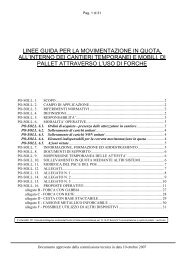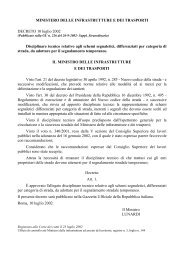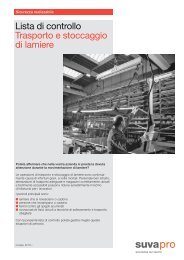Riconquistiamo il paesaggio - ACCA software SpA
Riconquistiamo il paesaggio - ACCA software SpA
Riconquistiamo il paesaggio - ACCA software SpA
You also want an ePaper? Increase the reach of your titles
YUMPU automatically turns print PDFs into web optimized ePapers that Google loves.
312<br />
CAPITOLOV - Paesaggi e partecipazione<br />
del “Fac<strong>il</strong>itatore”, ruolo importante nella guida del piccolo gruppo.<br />
L’intensa attivazione di coloro che sono stati i “fac<strong>il</strong>itatori” nel percorso di nascita<br />
dell’Ecomuseo ha permesso di raggiungere nel successivo progetto, realizzato<br />
all’interno del Programma Comunitario RURALMED 2. linea tematica “Paesaggi<br />
della ruralità contemporanea” dell’Atelier dei Paesaggi Mediterranei, in breve tempo<br />
interessanti risultati, condensati nel termine di Azioni Paesistiche, quali la riproposizione<br />
di una serie di antichi percorsi, la nascita di gruppi di acquisto dei<br />
prodotti biologici e “autoctoni” prodotti nei diversi territori, che hanno permesso<br />
lo sv<strong>il</strong>uppo di nuove relazioni significative tra gli abitanti, i luoghi, i modi di produrre,<br />
di percorrere <strong>il</strong> territorio, assim<strong>il</strong>ab<strong>il</strong>i ai concetti di Mercato e Mob<strong>il</strong>ità<br />
relazionale. La ricerca azione ha infine prodotto nuovi approcci alla pianificazione,<br />
attraverso lo Slow Planning, ovvero forme di pianificazione condivisa e corale che<br />
possono accompagnare/stimolare i piani e programmi urbanistici dei comuni. Perseguendo<br />
i principi fondamentali ecomuseali, si sono progettati i primi allestimenti<br />
sul tema dell’Acqua, a cui si ipotizza potranno seguire <strong>il</strong> tema del “Paesaggio della<br />
pietra” e del “Paesaggio della terracotta”, mentre proseguirà la raccolta delle<br />
storie del territorio, grazie ai racconti degli anziani, e la ri-visitazione, in chiave contemporanea,<br />
dei saperi, delle feste, della creatività locale…<br />
Abstract<br />
In the p<strong>il</strong>ot project Ecomuseo del Paesaggio orvietano (Ovietano’s Landscape Ecomuseum),<br />
after a first phase of test on the various analysis methods and the “waking<br />
up” of the citizens to the qualities, values, and also negative elements of the local landscapes,<br />
is beginning the carrying out of a first course, based on all the elements identified<br />
by participative process.<br />
The project try a relationship between two leader approach to the local development:<br />
the first, who start from the territorial resources analysis and valorisation by integrated<br />
actions strategies, and the other of “bottom-up”, hearing of demands expressed<br />
by who lives in the territories On regard of this start up objectives, was been natural<br />
introduce, as one of the main element of the project, the local community participation.<br />
The workshops activated with inhabitants had product 6 “Parish Maps” or “Community<br />
Maps”, that represent a screen as every Community, with his own different<br />
components of sex, culture and age, “view” his own place of life. At the same time it<br />
means that citizens became “actors” in the process. An other fundamental element of<br />
the project is the Atlas of Community Heritage, a GIS Dbase that collect all the dates,<br />
documents, publications, photo (new and aged), projects (proposal or carrying out)<br />
relevant to the landscape theme, that’ll be useful also during the carrying out phase.<br />
In a second project, related to the first, inside the E.U. program RURALMED 2, was<br />
been aged “landscape actions” as the renewal of ancient races, the organisation of GO-<br />
DO (group of direct shopping of biological product) that have permitted growing of new<br />
relationship between citizens, places, way of produce, called “relationship store and mob<strong>il</strong>ity”.<br />
The research have also start up new approach to planning, the “Slow Planning”, that<br />
suggests, follows the formal Plan of the Municipality. In the last phase was been designed<br />
the “Water Landscape” and “Water Course” setting, starting the carrying out of the Ecomuseum.<br />
We hope at this first can w<strong>il</strong>l go on with “Stone Landscape” and “Earthenware<br />
Landscape”, wh<strong>il</strong>e is going on the tales collection, between the narration of the aged people,<br />
and the renewal of ancient feast, ancient knowledge, by the local creativity…





